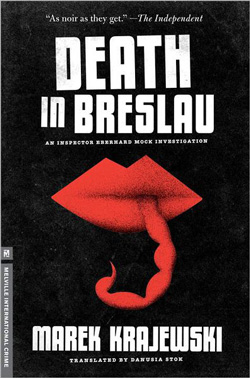
Even in the bright sun and sweltering heat of July, Breslau is a dark, cold place. Suspicion runs high, and with good reason: everyone has something to hide, from sexual fetishes and peccadilloes to political inclinations and allegiances, to the roots of a murderous vendetta that spans generations.
In German-occupied Breslau, 1933-34, you can’t trust anyone, not even the police.
Marek Krajewski, a lecturer at the University of Wrocław (formerly Breslau), has written a complicated, sometimes funny, sometimes unsettling story set in a complicated, rarely funny, terribly unsettling time.
It begins with the rape and murder of a teenage girl and her governess on a train from Berlin to Breslau. Their deaths were violent and bizarre; the murder scene filled with gruesome clues. Counsellor Eberhard Mock, Deputy Head of the Criminal Department of the Police Praesidium, is fetched from his customary Friday night visit to his favorite bordello to investigate the crime. His displeasure over the interruption is mitigated by the fact that he had known the murdered girl since she was a child. Her father, a baron, is Mock’s associate and patron. Mock feels a personal obligation to investigate. Nevertheless, his reaction under the circumstances is not what one might expect.
Mock frequently caught himself reacting to tragic news with perverse thoughts, and to a shocking sight with amusement . . . . So too now, when Forstner slipped on the puddle of blood which covered the floor of the saloon car, Mock burst out laughing. Koblischke did not expect such a reaction from the Counsellor. He, himself, had seen a great deal in his time, but the spectacle in the saloon car set him shaking for a second time. Forstner left the carriage, Mock began his inspection.
Inappropriate behavior, questionable ethics, and patterns of deception are the standards here. Self-interest and self-preservation are the motivating forces. An innocent shopkeeper is falsely accused of the murders, tortured, and killed while in custody. Doctors and scholars—the intellectual elite in a city that has always prized knowledge and education—will attest to anything for a payoff or for some perceived protection from the Nazis’ increasing power. Everyone has reason to feel threatened.
A new order had come to pass. The old camp for French prisoners of war on Strehlener Chaussee in Dürrgoy had been turned into a concentration camp where the first to find themselves were Mock’s close acquaintances: the former President of Breslau police, Fritz Voigt, and the former Mayor, Karl Mach.
Mock is a manipulator and largely unscrupulous, and that makes him a survivor—no easy feat in Breslau. It’s hard to admire him, easier to understand him.
When the murder investigation is reopened (because the original arrest and its aftermath satisfied no one) it is led by Herbert Anwaldt, a “specialist in crimes of a sexual nature” recently arrived from Berlin. Although they’re working together, Mock’s role in the original arrest of Friedländer, the innocent shopkeeper, is one of the things Anwaldt must examine.
Mock slowly drank his tea.
“You’re very categorical, young man.”
Anwaldt drank half a cup in one go. He wanted, at all costs, to show the Director how confident he felt in matters such as these. And it was precisely self-confidence that he lacked. He was behaving, right now, like a little boy who has wet his bed in the night and, on waking in the morning, does not know what to do with himself. . . .
“I’d like a transcript of Friedländer’s interrogation please.”
The alliance between Mock and Anwaldt is precarious. Over time, however, they develop a sort of father-son relationship, albeit a deeply damaged one, that carries with it a host of perils both physical and psychological.
Death in Breslau, originally released in Poland in 2006, is the first novel in Krajewski’s best-selling Eberhard Mock Quartet. Atmospheric and uncompromising, it is noir with its dark underbelly fully exposed in an unusual setting: occupied Poland, where with each passing day it grows harder to tell black from white.
See more coverage of new releases in our Fresh Meat series.
Leslie Gilbert Elman is the author of Weird But True: 200 Astounding, Outrageous, and Totally Off the Wall Facts. Follow her on Twitter @leslieelman.
Read all of Leslie Gilbert Elman’s posts for Criminal Element.
